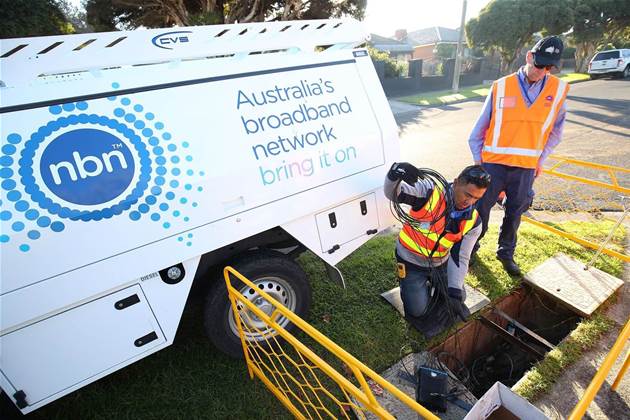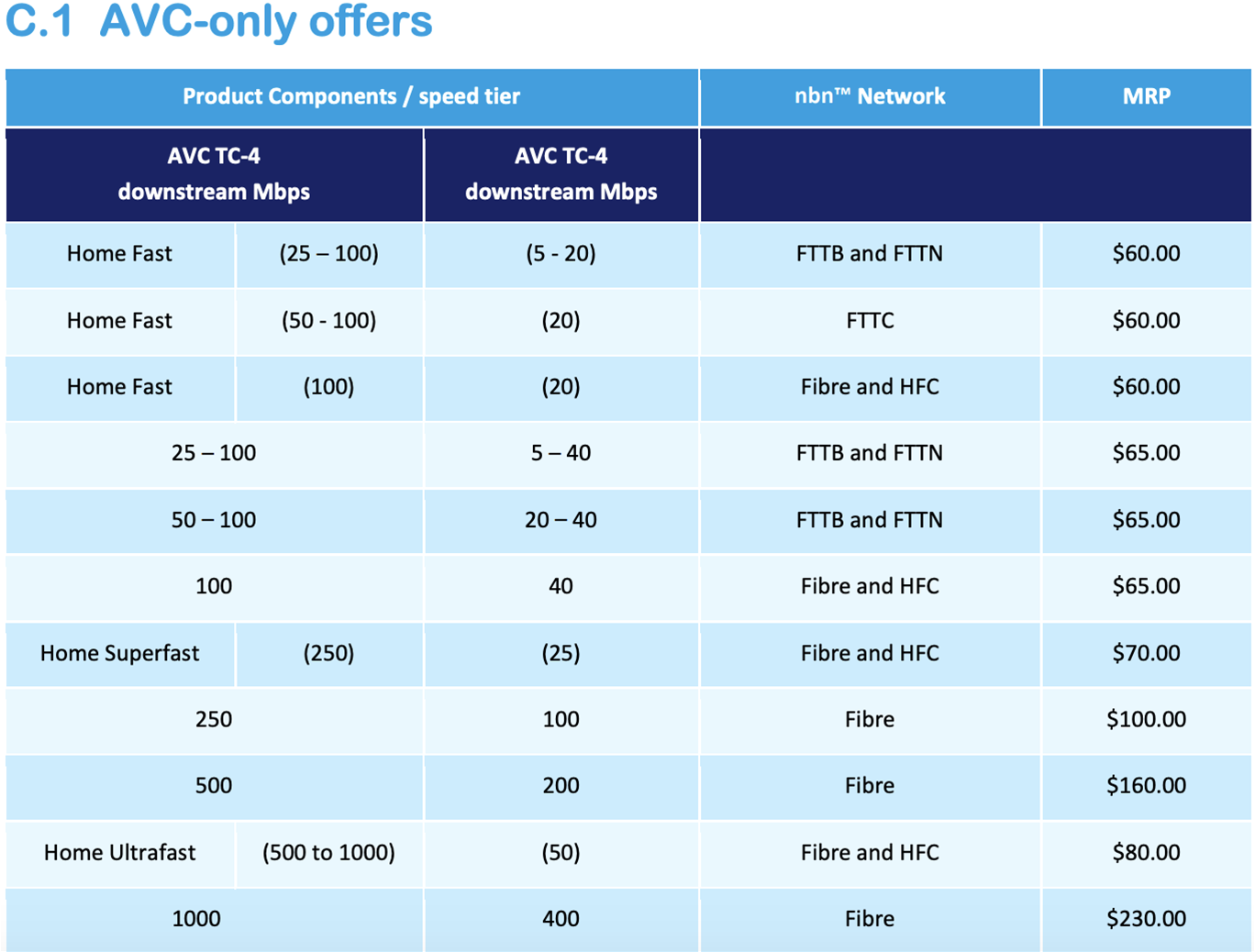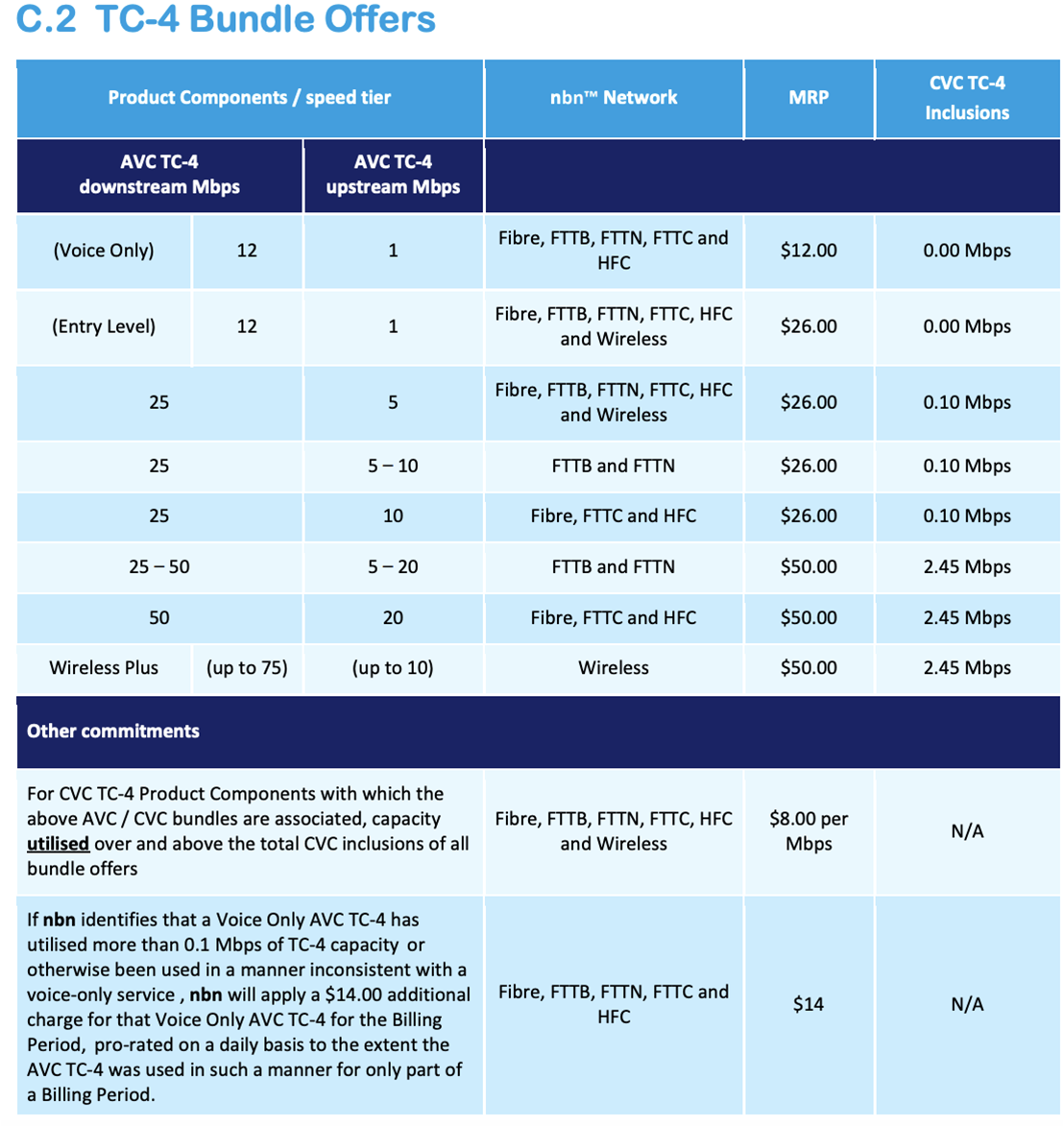NBN Co intends to make "up to" 25Mbps its new entry-level broadband tier and scrap variable consumption-based charges on higher speed services under a “transformational” shift.

The company released a paper late on Wednesday that contains the new price construct presented to an ACCC-convened roundtable at the end of last month.
The paper, sighted by iTnews, also contains a series of commitments that NBN Co said it would make via a revised special access undertaking (SAU) that it intends to lodge with the ACCC next year.
One of the big changes is the reset of the most basic NBN speed tier for broadband, from a 12/1Mbps speed profile to 25/5Mbps.
NBN Co said it would still allow retail service providers (RSPs) to offer a 12Mbps internet service if they wanted, but would structure its wholesale charges such that a 25Mbps service cost about the same.
The ACCC has had a long-term ambition for NBN Co to create and market an entry-level product with unlimited data quota that could be retailed for $60 a month.
NBN Co has previously opposed the idea, and it’s unclear whether an unlimited service would be possible under the conditions that NBN Co has set out for its offer.
“NBN Co now proposes to reposition its 25/5 Mbps service as its entry level broadband offer, by offering a voice-only service using the 12/1 Mbps speed tier across all fixed line technologies for $12; and offering 25/5 Mbps services across all access technologies (other than satellite) for $26, with 0.1 Mbps of included CVC [connectivity virtual circuit bandwidth] capacity,” the operator said.
“For ease of transitioning existing services to this new entry level broadband proposition, NBN Co will retain the ability of RSPs to use 12/1 Mbps services for broadband supply, with non-voice use on the 12/1 Mbps service attracting a similar notional price as the entry level 25/5 Mbps service.
“NBN Co’s proposed 25/5 Mbps pricing will permit RSPs to purchase entry level services with 0.1Mbps of inclusions plus 1.1 Mbps of CVC overage for $34.80, which should enable the supply of corresponding retail products for $60.”
Repositioning 25Mbps as the most basic service is likely to bring closer scrutiny to the number of premises that are still unable to achieve that speed, either at all or with any great consistency.
Full price construct
Confirming prior reporting by iTnews, NBN Co intends to charge a flat wholesale price per month on services 100Mbps and above, while retaining the existing price model - comprising fixed and variable components - for lower tier plans.
Pricing of lower-tier plans could be remodelled to flat-rate at an unspecified point down the track.
The wholesale price ceiling for services is at the bottom end of what was first proposed in June.
The higher-tier services - those with flat-rate pricing - would incur yearly increases, which NBN Co said it wants to set at inflation plus three percent.
With inflation currently running at three percent, higher tier services would see yearly price increases of up to six percent, although whether NBN Co could do that without impacting consumers’ willingness to pay for services is debatable.
Under the new proposal:
- 100Mbps services, which NBN Co brands ‘Home Fast’, would cost $60 a month wholesale, compared to a previously announced price range of $60-$63 a month;
- 250Mbps (‘Home Superfast’) would cost RSPd $70 wholesale a month, compared to a range of $70-$76, and;
- Up to gigabit *(‘Home Ultrafast’) would cost $80 wholesale a month, compared to a range of $82-100.
These wholesale prices are before any yearly increases incurred.
However, NBN Co raised significant concerns at what the pricing might do to its revenue.
The language of the report appears to suggest that the company would like an opportunity to somehow test the prices before enshrining them in the long-term commitment of the SAU
“Typically, NBN Co would introduce and test the demand and revenue impacts of such a transformational shift through the introduction of discounts, as [we] did when successfully introducing bundled pricing,” the company said.
“However, NBN Co recognises the desire expressed by RSPs, including in the working group discussions, for greater certainty in NBN Co’s wholesale pricing, and accordingly NBN Co is proposing to commit to introducing these offers into the SAU.
“The impact of NBN Co committing to such a fundamental shift in its pricing into the SAU prior to having tested that pricing in market conditions is that NBN Co would risk entrenching, in its long-term regulatory framework, prices which are set at inefficient levels, failing to adequately allocate the costs of the network to users that gain the greatest value from it.
“This would not be in the long-term interest of end users.”
NBN Co appears to be working off the assumption that it will not be able to ‘road test’ the maximum prices prior to having them built into long-term regulated conditions, and may therefore be trying to cushion that impact through the yearly price increases on services 100Mbps and above.
“For [flat price] offers, nbn is proposing an annual price control of CPI + three percent,” it said, a construct it previously called ‘CPI + X’.
“NBN Co considers that an X of three percent for the first regulatory cycle is appropriate for [flat price]-only offers, as it provides NBN Co with an appropriate degree of flexibility to address the demand-side risk faced by NBN Co in connection with these offers, particularly given their novelty and unknown impact on demand.
“It also provides NBN Co with greater ability to continue to invest in its network to maintain and improve service quality.”
RSP reaction
A separate summary report released by the ACCC indicated that there "appeared to be support from the working groups to remove volumetric charges from higher speed TC-4 (best effort broadband) products from commencement of the next regulatory period with potential for other speed tiers to later move to [flat-rate] pricing."
"There was however no agreement reached as to where the dividing line on such speed tiers should be drawn, or the level or form that the remaining volumetric CVC charges should take," the ACCC noted.




_(23).jpg&h=140&w=231&c=1&s=0)
.png&h=140&w=231&c=1&s=0)
_(20).jpg&h=140&w=231&c=1&s=0)
_(33).jpg&h=140&w=231&c=1&s=0)





 iTnews Executive Retreat - Security Leaders Edition
iTnews Executive Retreat - Security Leaders Edition
 iTnews Benchmark Awards 2026
iTnews Benchmark Awards 2026
 iTnews Cloud Covered Breakfast Summit
iTnews Cloud Covered Breakfast Summit
 The 2026 iAwards
The 2026 iAwards











_(1).jpg&h=140&w=231&c=1&s=0)



